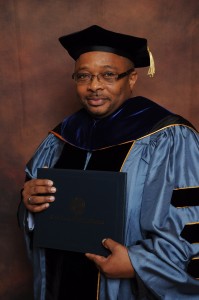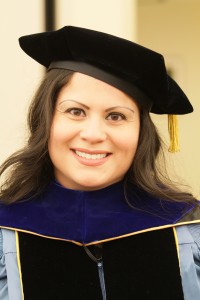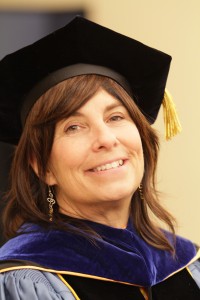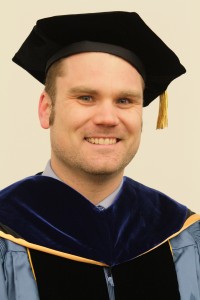
The students—Truman Hudson Jr., Andrea Juarez, Peggy Sepetys and Joshua Tolbert—may be part of the historical first Ed.D. class, but it’s what they are doing off campus that is likely to leave a lasting legacy.

Truman Hudson Jr. knows the plight of the student in the margin, the student who could fall through the crack. He knows because he was that student. Now he’s using his role as a social economist to reach out to students and address inequalities in education. His dissertation project, Klub DEX, an economic club that teaches kids to take a critical look at the world around them and then apply that knowledge practically, is just the beginning.
On why he gets up in the morning: “I’m on a mission to empower others to realize their potential.”
The epiphany: “After retaking microeconomics with an instructor who demystified economics by making personal connections and employing cooperative learning strategies in the classroom, I realized that many of my undergraduate instructors and K-12 teachers were unfamiliar with the approaches that were best suited for engaging students in the margins in instruction.”
A surprise finding: “With my dissertation topic I set out to explore the question: Could instruction in economics empower students in the margins to affect change in their schools and communities?
“I was surprised to learn that although the school district where the study was situated was rich with resources, there was a vast array of students' concerns that still went unmet. In building on the resources in the community, my findings suggested, in order for educators to positively influence student development, there is a need for more teachers to create a culture of care in their classrooms.”
The next steps: “I will continue to work with underrepresented youth in higher education via concurrent/dual enrollment or similar programs. Over the next three to five years I will expand Klub DEX to multiple communities and work with educational, governmental, community, business and nonprofit leaders to develop programming and curriculum that addresses the inequities in education.”
"My life’s work will be complete when students in the margins are able to exercise their voice and realize positive changes in their communities."

Andrea Juarez. Photo by Millard Berry.
Andrea Juarez (’08 M.P.A.) quickly realized a missing component of student success when she began working with Detroit Public Schools students: They lacked the basic information they needed to make college and career decisions. Her work in advising and administration has helped students reach their goals, and now she hopes research she’s conducting will further prepare students for success.
On why she gets up every morning: “I know the day is filled with moments to learn and moments to teach. I look forward to both!”
Taking the plunge: “Earning a doctoral degree seemed to be outside of my reach for many years. I was raised in a very humble home in an impoverished Detroit neighborhood. Higher education didn’t always seem reachable. Once I earned my Master of Public Administration degree, I not only felt a sense of gratitude and pride, I also had a new burst of confidence in myself. I decided that I wanted to be able to help students at a level beyond advisement, and to do so, I needed to be able to conduct research."
Language matters: “My study focused on how women of color attending community college perceived their use of language inside and outside of the classroom. In particular, I wanted to know if women of color believed that their use of language would impact their educational and professional goals. My interest derived from walking the halls of the community college and realizing that most students utilized variations of English such as African American Vernacular English. In addition, I received many complaints from our clinical partners indicating that although our students performed well skill wise, they lacked appropriate affective behaviors, which included communicative competence.”
The aha moment: “My biggest ‘aha moment’ was learning how students associated language with culture and chose to utilize the language that best aligned with their cultural background. I also learned that language use continues to be gendered. Women in my study often self-censored or silenced themselves from classroom participation in an effort to create a peaceful learning environment.”
“My life’s work will be complete when I have reached the level of courage that allows me to seek and speak truth without fear or hesitation.”

Peggy Sepetys. Photo by Millard Berry.
Peggy Sepetys had been an education practitioner for nearly 20 years, but felt she still had more to accomplish in the field of special education. On the advice of her adviser, Belinda Lazarus, she focused her coursework on educational technology along with her degree in special education. Now that decision is opening doors to a new way to reach students with disabilities.
Choosing to Go Blue: “I began a search for a doctoral program just as UM-Dearborn was putting together the first cohort. I found myself particularly drawn to the concept of working together with like-minded people. It was absolutely the best choice. Going through the program with people who both challenged and cared about each other was priceless.”
On self-discovery: “I found that even with all the work I had done and courses I had completed there was still an enormous amount that I didn’t know—and needed to know—in order to complete the dissertation. After some extremely frustrating days I discovered I had the resources within me to persevere and find the answers myself.”
The next frontier: “I have taken a position as the manager of special education at Great Lakes Cyber Academy, a 100 percent virtual high school that is staffed by teachers to provide individualized education to all students. I have a continued passion to provide the best education to all students with disabilities. If, as Dr. Lazarus and others predict, the opportunity to attend school online continues to grow then those of us in the field of special education must determine the best was to instruct students in this setting.
“I am unwavering in my desire to be on the forefront of innovative methods to do so.”
Sepetys, in three words: “Passionate, stubborn, caring.”
“I get up every morning because I still have lots to accomplish before I am done.”

Joshua Tolbert. Photo by Millard Berry.
Joshua Tolbert (’07 M.A.L.S.) entered the field of education, in part, to share his love for Spanish with others. So when the State of Michigan enacted a world languages graduation requirement for students of all learning abilities, he wondered about the best practices for teaching students with learning disabilities. Now he is using what he has learned to develop further strategies to teach Spanish—and all vocabulary—to students with learning disabilities.
Choosing education: “I decided to pursue a career in education in my second year at Western Michigan University. Part of the decision was based in wanting to share my enthusiasm for Spanish and the visual arts with others. I was blessed to find inspiring teachers at each stage of my life and to have a mother who taught me that working for social justice was important.”
The aha moment: “Shortly after Michigan enacted the world languages graduation requirement, two related themes caught my attention. First, I observed that Spanish teachers sometimes were not overly enthused about students with learning disabilities enrolling in their classes. Second, many of those same teachers were already using explicit strategies, differentiated instruction and multi-sensory approaches that likely could be used more deliberately to improve learning outcomes for students with learning disabilities.
“Exploring the relationship between Spanish and learning disabilities in greater depth suddenly became very interesting to me.”
On the horizon: “During the next five years, I intend to expand upon my dissertation research and to further address meaningful ways to include students with learning disabilities in the study of world languages. One aspect of this goal is to develop further strategies to help students with learning disabilities to succeed in learning Spanish.”
Tolbert, in three words: “I resist categorization.”
“My life’s work will be complete when I have helped younger people use their ideas and abilities to keep making the strange and wonderful world a little better for everyone.”




